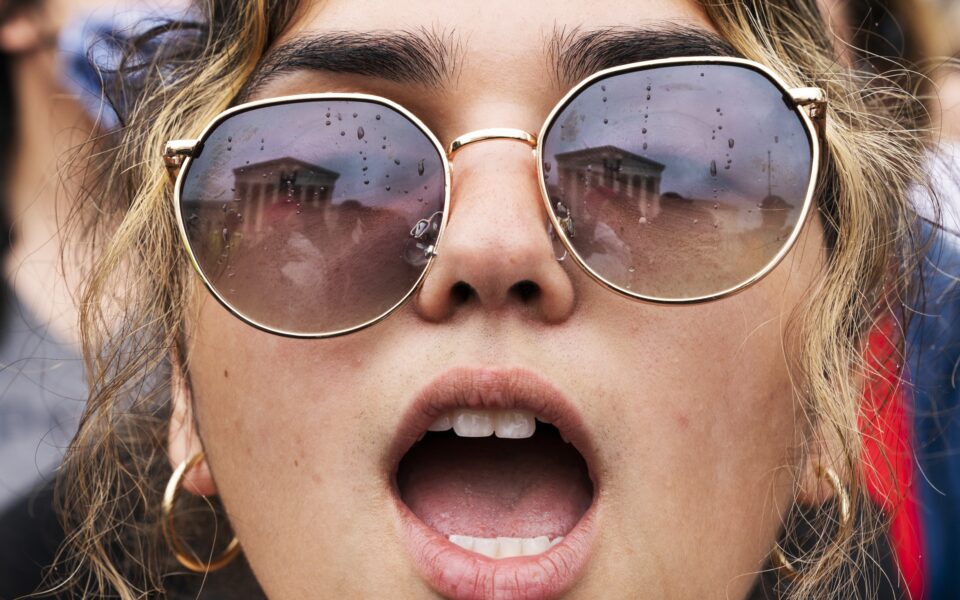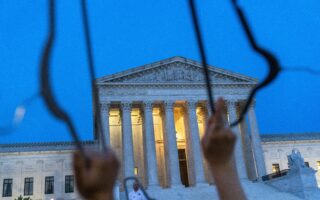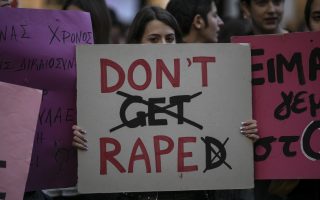The handmaidens of the right

It was the decade of the 70s when my friend Katerina and I were students at Pierce College in Athens. With our group of friends we spent happy, carefree days exploring the old city, its galleries and parks, its nightspots and museums.
Katerina had recently ended her relationship with a charming Australian. Actually, he ended it abruptly and with a cruelty I had never seen before. Of course I had seen the signs… his gaslighting her, lying on occasion. And then that usually beautiful, olive-skin face of hers began to show an occasional bruise.
She was nearly 19. She would have done almost anything for her first love, but not that. She told me that he was jealous, he slapped her, and then again, and finally he forced himself on her. Or to be more clear, he raped her. Then he laughed, left the apartment and soon left for Melbourne. My initial relief didn’t last. Kat wasn’t recovering. Her face had turned pale lately, a shade whiter than snow. We were young and I felt helpless.
Easter was upon us. We climbed the hill to the old church in the Plaka. It was hot that spring, and the combination of the heat, incense and flowers sent Kat reeling. She collapsed on the floor and our friends and I carried her out to the courtyard. Something was very wrong.
I suggested that we go to her parents, who lived on Crete, but she started sobbing, explaining that her parents would explode, force her to go home, and would finally derail her life and her hopes of becoming a doctor. My own parents were in Washington, too far to consult with. They wouldn’t understand anyway.
I won’t forget that face, inconsolable, hopeless. It was confirmed that Katerina was two and a half months pregnant. She was young and inexperienced, as was I. The shame I feel to this day makes me sad. She actually leapt down marble steps. She drank some strange liquid that made her vomit. I pleaded with her to talk to a doctor, to look into possible solutions, either to keep the child, or give it up for adoption or even seek out an abortion. She had decided. She had to end this life growing within her.
Laws on abortion in Greece were somewhat contradictory and definitions of the egg and the fetus were changing. It wasn’t until 1986 that Law 1609 was passed, allowing abortions to be performed in hospitals for women whose pregnancies had not exceeded 12 weeks.
But this was the 70s. We learned of the legal obstacles. Kat began making frightening comments about ending not only the life of the fetus, but her own as well. I was desperate. She could barely speak. It was then that I asked a young aunt of mine, someone I trusted, for advice. There was a clinic in Piraeus which we visited. I supposed that their activity, which was mainly obstetric, was not confined to delivering babies. The clinic was very clean, very light, with a serious but kind staff who spoke to us about all the possible consequences. The discussions were long and hard. But Katerina had made her decision.
The United States has the highest maternal mortality rate of all developed countries in the world. It also has 57 times as many school shootings as the other major industrialized nations combined
I think back on those months and that day, long gone now. Kat became a doctor, one of Greece’s finest. But the story is not about Katerina. It is about choice. The choice of a human being to decide by herself what will occur in her own body.
In an increasingly shocking downward trend, freedom of choice is now being challenged in the world’s superpower. The Supreme Court of the United States is poised to overturn a legal precedent, known as Roe vs Wade, 410 US 113 (1973). This was a hugely significant decision in which the Court ruled that a pregnant woman’s freedom to choose to have an abortion without excessive government restriction is protected by the Constitution of the United States.
The reasons why this decision, after 50 years, is being challenged are many and complex. In brief, they have to do with a sharp movement to the right, a power play amongst conservatives to appeal to an evangelist base in America who have never accepted a separation of Church and State. The movement also serves the interests of that base to keep the lower economic class as powerless as possible.
The United States has the highest maternal mortality rate of all developed countries in the world. It also has 57 times as many school shootings as the other major industrialized nations combined. People are free to buy assault rifles, but soon they may not be legally allowed to decide whether to give birth or not. In the meantime, children continue to be killed in school shootings. The hypocrisy of this “moral” stance is crystal-clear.
To frightened women everywhere, the issue is clear and the moral implications comprise a “dilemma” only for the unthreatened. It is mistakenly assumed that the disagreement is between two sides, one favoring pro-life and the other pro-abortion. But could anyone truly state that they are pro-abortion, as if this is taken lightly and nonchalantly? There is an overriding priority here for me and for millions of us. It is one of personal choice.
This is my body. I am not a vessel for some unactualized principle. I am not a handmaiden or a cog in a machine of your created beliefs. If babies were developed in jars or bottles, then obviously the priorities change. But as long as a birth comes from a living human, that person, that individual, must maintain the right to choose what will happen to, and in, her body.
I would leave the psychological second guessing and discussions of higher ethics to the philosophers and priests/theologians – and of course to young people, for whom it is natural and desired to think about these issues. In the meantime, we must fight to maintain certain rights and secure the laws, whether they be federal or state, to protect us. These rights, in my opinion, are not “inalienable.” They are not “given” by any supreme being. They must be upheld by laws in any democracy. Religious tenets will not protect us. And they shouldn’t. And they won’t.
Tenia Christopoulos is a freelance writer from Washingtonian, DC, who lives in Athens. She is a contributor to Kathimerini, The Washington Post, Insider Magazine and Tatler, and is the author of “Lords of the Dance.”





